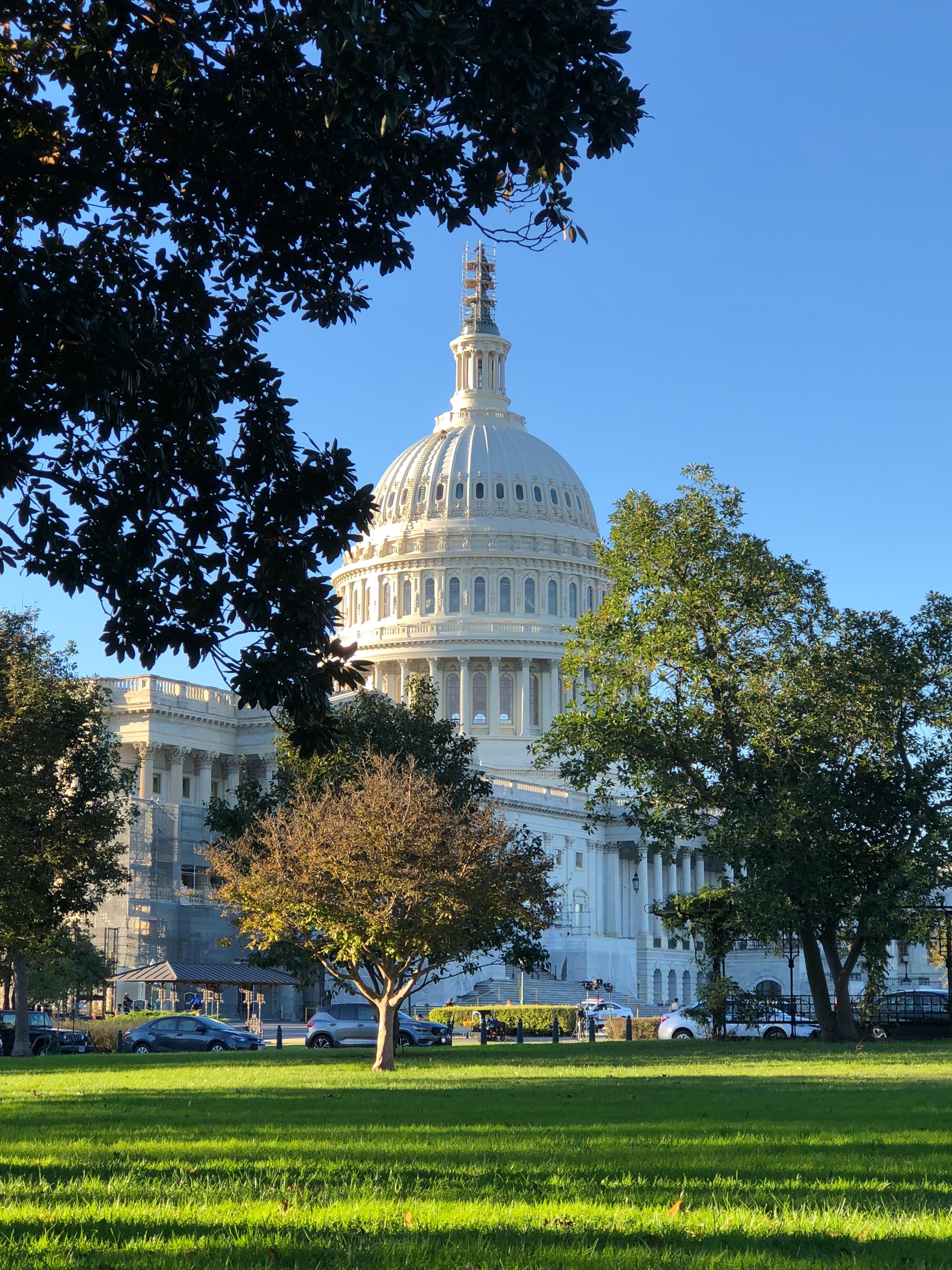The following letter was sent to the Biden-Harris team on Jan. 15th (pre-inauguration), with 55 organizations signed on. We plan to re-send the letter soon, once the Biden Administration is settled into their offices. To this end, groups are invited to sign on using this automated form.
January 15, 2021
Dear President-Elect Biden and Vice President-Elect Harris:
On behalf of our millions of members, supporters, and collaborating experts, we urge your Administration to move quickly to use the federal government’s procurement, educational, research, and financial capacities to help Americans shift to a more plant-based diet. A broad-based dietary shift is vital to helping your Administration achieve many of its stated climate change, public health, environmental and justice goals and priorities. We stand ready to assist you with this urgent work.
The crucial connection between food choices and climate has long been overlooked. While individual food choices often reflect personal, cultural and life-style choices, government policy can profoundly affect – and for many decades has shaped – those choices. A meat-heavy diet, like the current typical American diet, both has an outsized climate impact and contributes to a wide range of chronic diseases,[1] skyrocketing healthcare costs, and a population more vulnerable to the coronavirus.[2] Moreover, obesity, hunger, and diet-related chronic illness disproportionately[3] impact communities of color, and have contributed to disproportionate diet-related COVID-19 co-morbidities and fatality risks to people of color. Eating less meat and more unprocessed plant foods can reduce diet-related disease and health disparities; and a healthier American population will be able to better withstand future viral pandemics.
Your Administration has a tremendous opportunity to help Americans better understand the consequences of their dietary choices and make healthier and more sustainable choices more widely available, affordable, and convenient. In your transition documents, you identified the connection between climate change and America’s food choices. You also articulated a plan to reduce greenhouse gas emissions from food production and store carbon dioxide in the ground through more sustainable agriculture. Many peer-reviewed studies[4] demonstrate that a significant reduction in meat and dairy consumption (and production) would have enormous climate benefits by reducing methane emissions from cattle and manure, nitrous oxide emissions from animal feed production, and deforestation and grassland conversion for cattle pasture and animal feed cropland. Indeed, land conversion for meat and dairy production directly counteracts your stated goal to improve carbon storage in soils and ecosystems.[5] Recent research suggests that supply-side measures alone are insufficient and that robust demand-side action in the agriculture sector is critical in order to meet climate targets.[6] Most crucially, failing to address the population’s unsustainable food choices will make it impossible to meet the Paris Agreement goal of staying well below a 2 degrees Celsius global temperature rise.[7]
We ask you to affirm the central connection between climate change, health and America’s food choices in the Biden Administration’s climate plans, including any executive orders. We ask that the Biden Administration advance this connection through a whole-of-government approach via an interagency process that includes the Department of Agriculture, Health and Human Services, Environmental Protection Agency, and the Centers for Disease Control and Prevention.
We further ask the Biden Administration to establish a stakeholder process that engages the medical and public health fields, world renowned nutrition researchers, environmental organizations and climate scientists, farmers, animal protection groups, and leaders of communities of color most impacted by health disparities and inequitable access to healthy food, with a goal of establishing federal policies and incentives that will accelerate a shift already underway toward more plant-based food and a healthier diet for all Americans.
We would welcome the opportunity to meet with your team to discuss these recommendations. Please be in touch with Jody Kass (Jkass@PlantPureCommunities.org), Coordinator of the Nutrition-Climate Coalition.
Sincerely,
50by40
A Well-Fed World
Alliance of Nurses for Healthy Environments
Animal Legal Defense Fund
Balanced.org
Better Food Foundation
Beyond Carnism
Black VegFest
Brighter Green
Center for Biological Diversity
Center for Food Safety
Cleveland Clinic Wellness Institute
Climate Healers
Coalition for Healthy School Food
Community Food Advocates
Earthjustice
Ethos Farm Project
Factory Farming Awareness Coalition
Farm Forward
Food & Water Watch
Food Revolution Network
FOUR PAWS
Friends of the Earth
GreenFaith
Having Kids, Inc.
Health Care Without Harm
Humane Society Legislative Fund
Jewish Initiative for Animals
Johns Hopkins Center for a Livable Future
Lean and Green Kids
Mercy For Animals
Million Dollar Vegan
Mobius
Moving Medicine Forward
National Hispanic Medical Association
New Entry Sustainable Farming Project, Tufts Friedman School of Nutrition Science & Policy
Nutritional Research Foundation
NutritionFacts.org
Paxto
Physicians Association for Nutrition
Physicians Committee for Responsible Medicine
Planetary Health Collective; The Nutrition Show
PlantPure Communities
Plantrician Project
ProVeg International
Reducetarian Foundation
Shamayim: Jewish Animal Advocacy
SOMOS Community Care
Strategies for Ethical and Environmental Development (SEED)
T. Colin Campbell Center for Nutrition Studies
The Humane Society of the United States
The Virsa Foundation Inc
True Health Initiative
Voters for Animal Rights
World Animal Protection US
Zero Hour
cc:
- Mr. Tom Vilsack, US Department of Agriculture
- Mr. Michael Regan, US Environmental Protection Agency
- Mr. Xavier Becerra, US Department of Health and Human Services
- Ms. Gina McCarthy, Domestic Climate Coordinator
- Mr. John Kerry, Climate Envoy
- Dr. Rochelle Walensky, Centers for Disease Control and Prevention
- Ms. Brenda Mallory, Council on Environmental Quality
Endnotes
- Amanda J. Cross et al., Prospective Study of Red and Processed Meat in Relation to Cancer Risk (2007), http://journals.plos.org/plosmedicine/article?id=10.1371/journal.pmed.0040325 (“Both red and processed meat intakes were positively associated with cancers of the colorectum and lung; furthermore, red meat intake was associated with an elevated risk for cancers of the esophagus and liver.”); Renata Micha et al., Red and processed meat consumption and risk of incident coronary heart disease, stroke, and diabetes: A systematic review and meta-analysis 7 (2010), https://www.ncbi.nlm.nih.gov/pmc/articles/PMC2885952/pdf/nihms203406.pdf (“Consumption of processed meats was associated with significantly higher incidence of both [coronary heart disease] and diabetes, with 42% and 19% higher risk, respectively, per 50 g serving/day.”); Trust for America’s Health, The State of Obesity 2020: Better Policies for a Healthier America (2020), https://www.tfah.org/wp-content/uploads/2020/09/TFAHObesityReport_20.pdf (42% of adults in the U.S. are obese, up from 26% in 2008. Childhood obesity is also on the rise, and 19% of U.S. young people ages 2 to 19 are obese, up from 5.5% in the mid-1970s).
- T. Colin Campbell, PhD., The Path to Recovery through Nutrition: Our Most Important Defense Against COVID-19 (2020), https://plantpurecommunities.org/the-path-to-recovery/ (The nutritional benefits of a whole food, plant-based diet “could be especially significant for those currently vulnerable to COVID-19.”); Fiona Godlee, Covid-19: What we eat matters all the more now (2020), https://www.bmj.com/content/370/bmj.m2840 (Obesity is a “key risk factor” for COVID-19, and diets richer in whole grains, fruit, vegetables, and legumes, with less red meat, are necessary to combat obesity and other health problems.); Healthy swaps key to reducing red meat intake during the COVID-19 pandemic, Harvard T.H. Chan School of Public Health, https://www.hsph.harvard.edu/news/hsph-in-the-news/reducing-red-meat-covid/ (“Frequently eating red meat raises the risk of some types of cancer, heart disease, and diabetes, which is an even greater problem than usual during the pandemic[.]”).
- Emelia J. Benjamin et al., Heart Disease and Stroke Statistics—2017 Update: A Report From the American Heart Association, American Heart Association (2017), https://www.ahajournals.org/doi/epub/10.1161/CIR.0000000000000485 (As of 2017, almost half of Black Americans had some form of cardiovascular disease – 47.7% of females and 46% of males. Latinos, Blacks, and Asians bear a disproportionate burden of diabetes in the US. 12.6% of Latino males and 12.7% of Latino females had diabetes, as compared to 8.0% of non-Latino white males and 7.4% of non-Latino white females).
- Dietary Guidelines Advisory Committee, Scientific Report of the 2015 Dietary Guidelines Advisory Committee 291 (2015), https://health.gov/sites/default/files/2019-09/Scientific-Report-of-the-2015-Dietary-Guidelines-Advisory-Committee.pdf (One study found that “a diet with 50 percent reduced total meat and dairy replaced by fruit, vegetables, and cereals contributed the most to estimated reduced risk of total mortality and also had the largest potential positive environmental impact.” ); EAT-Lancet Commission, Food Planet Health 12, https://eatforum.org/content/uploads/2019/01/EAT-Lancet_Commission_Summary_Report.pdf (Transformation to healthy diets by 2050, which will have both health and environmental benefits, will require “a greater than 50% reduction in global consumption of less healthy foods such as added sugars and red meat.”); Intergovernmental Panel on Climate Change, Global Warming of 1.5°C. An IPCC Special Report on the impacts of global warming of 1.5°C above pre-industrial levels and related global greenhouse gas emission pathways, in the context of strengthening the global response to the threat of climate change, sustainable development, and efforts to eradicate poverty 327 (2018), https://www.ipcc.ch/site/assets/uploads/sites/2/2019/06/SR15_Full_Report_Low_Res.pdf (“Dietary shifts could contribute one-fifth of the mitigation needed to hold warming below 2°C[.]”).
- Lucia von Reusner, Mystery Meat II: The Industry Behind the Quiet Destruction of the American Heartland, Mighty Earth 2 (2017), http://www.mightyearth.org/wp-content/uploads/2017/08/Meat-Pollution-in-America.pdf (“The scale and environmental impact of the meat industry is enormous: more than a third of all land in the continental U.S. is dedicated to growing feed crops and providing the pastures to raise meat.”).
- Intergovernmental Panel on Climate Change, Climate Change and Land: an IPCC special report on climate change, desertification, land degradation, sustainable land management, food security, and greenhouse gas fluxes in terrestrial ecosystems 487 (2019), https://www.ipcc.ch/site/assets/uploads/2019/11/SRCCL-Full-Report-Compiled-191128.pdf (“[D]emand-side management of the food system could be one of the solutions to curb climate change.”);S. Satz et al., Winds of change: the next environmental debate, Barclays 26 (2019) (“Improving agricultural practices appears to be insufficient in meeting the climate targets.”); Tim Searchinger et al., Creating a Sustainable Food Future: A Menu of Solutions to Feed Nearly 10 Billion People by 2050, World Resources Institute 2 (2018) (“Closing the land and GHG mitigation gaps requires that, by 2050, the 20 percent of the world’s population who would otherwise be high ruminant-meat consumers reduce their average consumption by 40 percent relative to their consumption in 2010.”); Walter Willett et al., Food in the Anthropocene: the EAT–Lancet Commission on healthy diets from sustainable food systems, The Lancet 472 (2019), https://www.thelancet.com/journals/lancet/article/PIIS0140-6736(18)31788-4/fulltext (“Improved production practices are less effective than a shift to healthy diets in abating food-related greenhouse-gas emissions because most emissions are associated with production of animal source foods whose characteristics, such as enteric fermentation in ruminants, have little potential for change. Increasing shift toward more plant-based diets will enable food production to stay within the climate change boundary.”).
- Michael A. Clark et al., Global food system emissions could preclude achieving the 1.5° and 2°C climate change targets (2020) (“[R]educing [greenhouse gas] emissions from the global food system will likely be essential to meeting the 1.5° or 2°C target.”); Intergovernmental Panel on Climate Change, supra note 4 (Adopting a “healthy” diet as recommended by Harvard Medical School could reduce greenhouse gas emissions by 36%, and “[d]ietary shifts could contribute one-fifth of the mitigation needed to hold warming below 2°C[.]”); Robert Lempert et al., Pathways to 2050: Alternative Scenarios for Decarbonizing the U.S. Economy, Center for Climate and Energy Solutions (2019) (Dietary changes such as lower meat and dairy consumption are necessary to achieve a dramatic drop in net agricultural greenhouse gas emissions.); Laura Wellesley et al., Changing Climate, Changing Diets: Pathways to Lower Meat Consumption, Chatham House viii (2015) (“We cannot avoid dangerous climate change unless consumption trends change.”).



